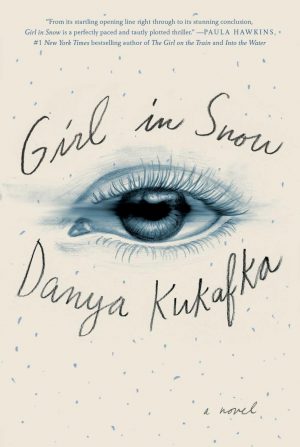You’re gonna miss me when I’m gone: a “Girl in Snow” review
Danya Kukafka’s debut thriller leaves much to be desired in terms of likable characters and a gripping mystery.

You never know what you’re going to get from a debut novel. On its hardcover jacket, there could be a solitary blurb on the back from a well-known author. But if the publishing company wants the book to do well, they’ll display a quote from that author on the front and continue with more praise when you turn it around. It’s always interesting to pick these up and see what other published writers have to say about them. Add to that a captivating cover, and you have the formula to attract a new reader.
This did the trick when I spotted “Girl in Snow” in a bookstore in Door County on summer vacation. I was pulled into that slightly smeared eye, the soft feel of the cover beneath my fingers and the promise of an invigorating mystery, one that involved the murder of a popular high school girl and three different people introspecting. It took me a while to get around to it, but I was hoping for the best as I flipped the deckle-edged pages.
Perhaps my expectations for this were too high. Danya Kukafka‘s debut thriller has its moments of startling prose and invigorating character development, but it rings hollow. Lucinda’s death is nothing more than a plot device to serve as the catalyst for the protagonists. Kukafka is aware of this, but I feel like when a murder such as Lucinda’s is the centerpiece of a novel, time should be spent rigorously developing that character and the case and not have it feel so halfhearted. I also find the way the story is told, in fragments that alternate between the past and present, disjointed. Add to that some unlikable characters, unquestionably weird writing choices and an anticlimactic ending, and we have an unfortunately lackluster novel.
Lucinda Hayes is found on an elementary school playground carousel late on a February night in 2005, blood dotting the snow around her. Her murder tears a hole into the lives of three different people. Cameron is a quiet and antisocial boy who loves art and has an unhealthy infatuation with Lucinda. Jade is an upperclassman who had her heart broken by a former friend/crush, all because Lucinda got to him. Russ is a police officer investigating Lucinda’s death, connections with his former partner on the force and his wife leaving him haunted. Each character has their own interesting quirks and ways of telling their histories and their current issues. Tenses change and dialogue loses its quotation marks at points.
But Kukafka also uses her narrators to address real problems existing in the world. For Cameron, it’s the biases of the fictional suburban public like Broomsville that pin those kids who are quiet and different into toxic boxes. For Jade, it’s body image issues among teenage girls and the domestic abuse they face for not living up to society’s expectations. For Russ, it’s the internalized racism and covering up of the police force, particularly dealing with Mexican immigrants and a case where one of the officers was arrested with the threat of assault charges.

Jade is the most compelling of the three narrators. Her immediacy and pain that so many girls struggle with (loss of your greatest friend, how you weigh, how you’re perceived by others) resonate, and I like her rebel without a care facade that crumbles to show her insecurities and thoughts in the form of a movie screenplay and an interest in Green Day and witchcraft. The fragments about her crush on Zap, the history of her mother’s alcoholism and bad behavior and the moments where she feels most vulnerable are great. If she had been the only protagonist and if Lucinda’s murder hadn’t been as important, this novel would have worked a lot better.
But instead, we jump from person to person, not only trying to deduce how Lucinda was murdered but also figuring out how these people became who they are now. A lot of these moments feel better suited for separate short stories instead of all smashed together. At points, the novel barely chugs along. Developments blossom slowly and sometimes all at once. It’s very uneven.
It also doesn’t help that a lot of the people here are the most disgustingly behaved of any novel I’ve read. Excluding Jade’s occasional moments of raw music blasting and snappy comebacks, there’s a lot of really bad conduct. From Cameron’s consuming obsession with Lucinda that leads to something akin to stalking, Jade’s mom and her drinking and use of lashing out, Russ’s complete dismissal of his wife’s culture and his lack of a spine and secondary characters involving themselves in illicit affairs and underage drinking, the shenanigans feel way too edgy and, as a result, gross.
Even with some pretty pose, Kukafka’s writing leans into depraved sexuality and strange wording at the drop of a hat. I lost track of how many times breasts were mentioned, flopping around and awkward. There’s leaning into voyeurism, the mountains surrounding Broomsville and even the people taking too keen of an interest in each other. There’s a panty flash, an older man’s hands being described as “Dad hands” or “man hands” and male genitalia that’s referred to as a “lactic muscle.” Ick.
Although not entirely an awful book, the more I think about “Girl in Snow,” the more I feel like it squanders a lot of potential. It may work for those who like characters looking into themselves, but the hope of a compelling mystery and thriller falls through. Without the heightened feelings of a thriller, the novel lacks what’s necessary to stick the landing. It ends up completely numb instead.
Your donation will support the student journalists of West High School. Your contribution will allow us to purchase Scholarship Yearbooks, newsroom equipment and cover our annual website hosting costs.

This is Luke's first and only year as a member of West Side Story. He'll be kept busy with anchoring, editing and reporting, but he's gonna have fun while...



